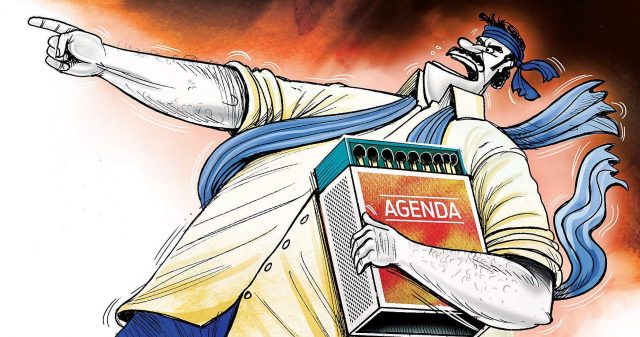
The nation observed Ambedkar Jayanti on April 14 around the time when there were disturbances in some parts of the country consequent to a judgement of the Supreme Court regarding the enforcement of The Scheduled Castes and the Scheduled Tribes (Prevention of Atrocities) Act, 1989. Much of the protests have been triggered by opponents of the Bharatiya Janata Party (BJP) who have tried to lay the blame at this party’s door in a bid to generate hostility against it among the Dalits, even as the Narendra Modi government filed a review petition in the apex court.
The political twist given to the court’s judgment and the violence on the streets is truly unfortunate because it goes against the firm advice given by Dr Ambedkar when the Constituent Assembly adopted the Constitution. Once the Constitution is adopted, he said, citizens must abandon the unconstitutional path to put forth their grievances. In the judgment that has triggered the agitation, the court said that there was misuse of the Act by vested interests to settle political scores, etc. It said that the underprivileged need to be protected against any atrocities to give effect to the Constitutional ideals and the Atrocities Act has been enacted with this objective.
It added: “At the same time, the said Act cannot be converted into a charter for exploitation or oppression by any unscrupulous person or by police for extraneous reasons against other citizens as has been found on several occasions in decisions referred to above. Any harassment of an innocent citizen, irrespective of caste or religion, is against the guarantee of the Constitution. This Court must enforce such a guarantee. Law should not result in caste hatred. The preamble to the Constitution, which is the guiding star for interpretation, incorporates the values of liberty, equality and fraternity”. Also, the Act was “not intended to deter public servants from performing their bona fide duties”.
Following the court’s judgment on March 20, agitators took to the streets and a Bharat Bandh was organised against what they called the “dilution” of the Act. They said the judgment would completely nullify the main purpose of the Act and actually protect the perpetrators of atrocities against the Dalits. While some questioned the theory that the Act was being misused, others said the premise on which the court had drawn its conclusions was incorrect.
There were also the argument that this would completely jeopardise the efforts of the Indian state to protect the Scheduled Castes and Scheduled Tribes, who have faced and continue to face oppression across the country. These arguments found resonance in many quarters.The Narendra Modi government promptly filed for a review of the judgment. It took the stand that offences under this Act were heinous crimes committed to humiliate and subjugate SCs and STs. It said the government was committed to ensuring the wellbeing of the Dalits and tribals and that it did not agree with the reasoning of the Supreme Court.
Law Minister Ravi Shankar Prasad said it was important to note that the Union Government was not a party to the proceedings at all and therefore, a very comprehensive review petition had been filed. The government also noted that less than 25 per cent of the cases filed under the Act resulted in conviction of accused persons. Therefore, the court’s judgement would only further impede justice for the victims of atrocities.
The government felt that the accusations hurled at it by its opponents were baseless because it enjoyed the confidence of the Dalits. Electoral studies have shown that the BJP’s share of the Dalit vote jumped from 12 per cent in 2009 to 24 per cent in 2014. Also, the party bagged 66 of the 131 Lok Sabha seats reserved for Dalits and tribals in the country. While doing so, it had completely wrecked the electoral base of the pro-Dalit Bahujan Samaj Party, which did not win a single reserved seat. The Congress also saw its Dalit base erode.
Speaking in the Constituent Assembly on 25 November 1949, Dr Ambedkar cautioned the citizens and told them what they should do if they wished to maintain democracy “not merely in form, but also in fact”. He said, “The first thing in my judgement we must do is to hold fast to constitutional methods of achieving our social and economic objectives. It means we must abandon the bloody methods of revolution. It means we must abandon the method of civil disobedience, non-cooperation and satyagraha. When there was no way left for constitutional methods of achieving economic and social objectives, there was a great deal of justification for unconstitutional methods. But where constitutional methods are open, there can be no justification for these unconstitutional methods. These methods are nothing but the grammar of anarchy, and the sooner they are abandoned, the better for us”.
Now that the Union Government has filed a strong review petition on their behalf, the Dalits and the tribal communities which are anguished over the court order, must allow the judicial process to take its course. Any group or community that feels aggrieved about something, must remember
Dr Ambedkar’s sage counsel, because, as he has warned, violent methods of protest could imperil democracy.
By A. Surya Prakash
Chairman, Prasara Bharati
(This article was first published on 24th April, 2018 in The New Indian Express)














